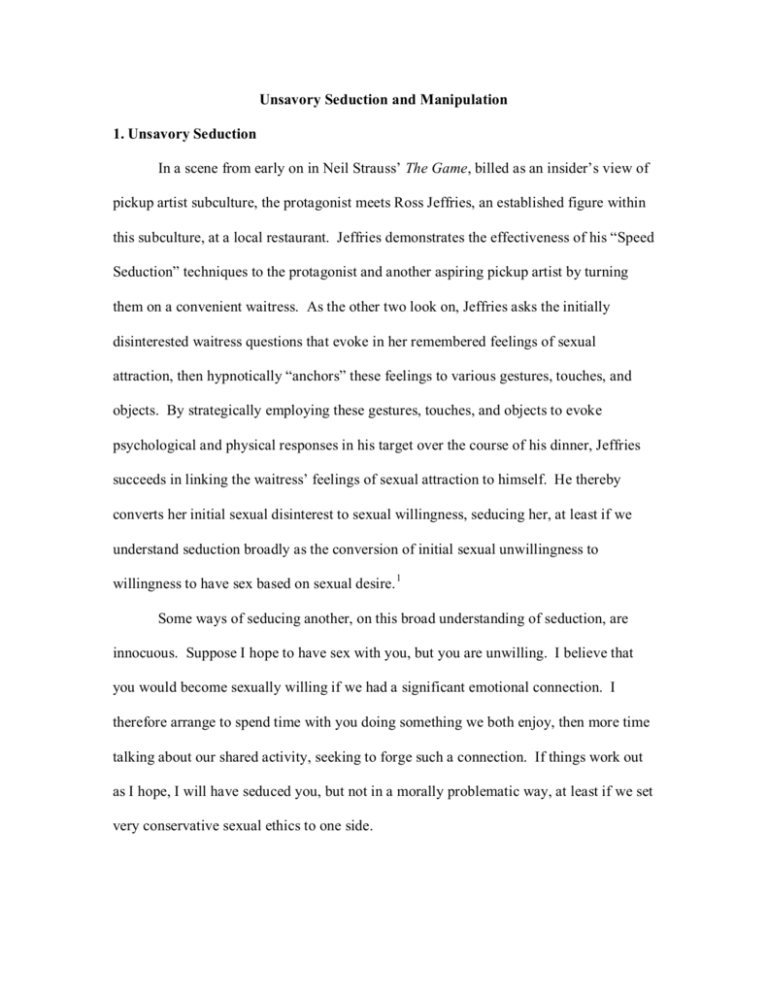
Unsavory Seduction and Manipulation
1. Unsavory Seduction
In a scene from early on in Neil Strauss’ The Game, billed as an insider’s view of
pickup artist subculture, the protagonist meets Ross Jeffries, an established figure within
this subculture, at a local restaurant. Jeffries demonstrates the effectiveness of his “Speed
Seduction” techniques to the protagonist and another aspiring pickup artist by turning
them on a convenient waitress. As the other two look on, Jeffries asks the initially
disinterested waitress questions that evoke in her remembered feelings of sexual
attraction, then hypnotically “anchors” these feelings to various gestures, touches, and
objects. By strategically employing these gestures, touches, and objects to evoke
psychological and physical responses in his target over the course of his dinner, Jeffries
succeeds in linking the waitress’ feelings of sexual attraction to himself. He thereby
converts her initial sexual disinterest to sexual willingness, seducing her, at least if we
understand seduction broadly as the conversion of initial sexual unwillingness to
willingness to have sex based on sexual desire. 1
Some ways of seducing another, on this broad understanding of seduction, are
innocuous. Suppose I hope to have sex with you, but you are unwilling. I believe that
you would become sexually willing if we had a significant emotional connection. I
therefore arrange to spend time with you doing something we both enjoy, then more time
talking about our shared activity, seeking to forge such a connection. If things work out
as I hope, I will have seduced you, but not in a morally problematic way, at least if we set
very conservative sexual ethics to one side.
But Jeffries’ seduction of the waitress is different. Jeffries does not seek to
convert the waitress to sexual willingness by altering himself or his relationship with her
so as to more fully satisfy her preferences, desires or needs. Rather, he seeks to bring
about such a conversion by altering her motives. And he seeks to alter her motives not by
rational argument, or even by clever suasion, but by using fairly crude conditioning
techniques to bypass her rational capacities as fully as he can. Such motive altering,
rationality bypassing seduction strikes many of us as morally problematic, as involving a
wrongful element significant enough to render it on-balance wrongful in at least some
circumstances. Or so I shall suppose.
I should clarify who we are. For my purposes, we are college- and universityeducated denizens of large contemporary Western democracies like the United States, the
United Kingdom, the Netherlands, or Australia. Individuals fitting this description have
been exposed to an overlapping set of core works of art, literature, history, natural
science, philosophy, and social science. As a consequence, such individuals (we) are apt
to exhibit some convergence in their (our) moral judgments across various domains.
Consider advertising. We regard much advertising as innocuous, but not all of it.
In 1957, market researcher James Vicary claimed to have substantially increased sales of
food and drink in a theatre by flashing “Drink Coca Cola” and “Hungry? Eat popcorn”
for 1/30 of a second at 5 second intervals during the showing of the film Picnic over a 6week period. Although the study turned out to be a hoax, there was considerable public
outcry about the practice, dubbed by Vicary subliminal advertising. 2 Subliminal
advertising attempts to create demand for a product by altering the motives of consumers
through means that bypass their rational capacities. Within a few years of Vicary’s hoax,
countries such as Australia, the United Kingdom, and the United States banned it (either
legislatively or through the relevant regulatory bodies). Over the years, studies of
subliminal stimuli have yielded mixed results, with only some providing evidence for the
motivational efficacy of such stimuli. 3 Subliminal advertising is nonetheless still widely
regarded as morally problematic among my intended audience.
Alternatively, consider recruitment to religious organizations. Religious
recruitment that seeks to alter targets’ motives by rational means may sometimes be
unwelcome, but it is widely regarded as innocuous. Things are different when the
members of a religious group seek to convert by means that bypass targets’ rationality,
through such techniques as sleep deprivation, separating potential recruits off from their
support systems, threatening ostracism from the recruiting group, and the like. Motive
altering and rationality bypassing religious recruitment gets called induction, or even
brainwashing, and it is widely regarded as morally problematic among my intended
audience.
I could go on, for there are other domains in which being both motive altering and
rationality bypassing renders a practice morally problematic. The making and
dissemination of propaganda comes to mind, as does retail sales, as well as the rearing
and education of children sufficiently developed to reason for themselves. Appeal to
even this partial list of practices suggests that across various domains, the combination of
being rationality bypassing and motive altering inclines members of my intended
audience to wonder whether a given practice is ultimately immoral or innocuous, and to
regard this issue as requiring further analysis to settle. For this reason, it is no great
stretch to suppose, as I have, that members of my intended audience would converge in
regarding Jeffries-style seduction as morally problematic.
I suppose that I could continue to use Jeffries-style seduction to refer to what I
take to be a recognizable category of morally problematic seductions. But this term is
cumbersome and not particularly apt. From here on, I shall instead use unsavory
seduction to refer to this category, which consists of all conversions to sexual willingness
accomplished by altering a target’s motives in ways that bypass his or her rationality.
The boundaries of this category are rendered indistinct by cases in which it is not
clear whether or not a target’s motives have been altered and/or her rationality bypassed.
I suspect that among members of my intended audience, the phenomenon I am calling
unsavory seduction shades into other forms of sexual pursuit, just as subtle forms of
product placement in films shade into subliminal advertising and high-pressure forms of
religious recruitment shade into induction or brainwashing. As will become apparent,
specifying unsavory seduction’s boundaries precisely is ancillary to my main interest
here, so I shall set this issue to one side.
Although we got an initial fix on unsavory seduction by thinking about Ross
Jeffries’ “Speed Seduction” techniques, it can be accomplished by any means of
intentionally altering another’s motives by bypassing his or her rationality: emotional
appeals, habituation, wearing down the other’s resistance, temptation, and the list goes on.
Of course, unsavory seduction can also be accomplished using uncontroversially immoral
techniques such as deception or extortion. If what I have said so far is correct, such
seduction is doubly morally troubling. It belongs to a category of seduction that is
morally problematic even when it is not accomplished by means of such techniques. And
it is accomplished by means of techniques that render any seduction morally troubling. I
will leave such morally mixed cases of unsavory seduction aside to focus on a puzzle
arising for pure cases of this phenomenon, unsavory seductions accomplished by
techniques not themselves uncontroversially immoral.
2. A Puzzle
If what I have said so far is correct, then we recognize a moral difference between
seducing someone and unsavorily seducing someone. But there is nothing morally
problematic about just trying to alter someone’s motives to try to get her or him to do
what you want. This is a fairly common, and morally unobjectionable, application of
rational argument. And there is nothing morally problematic about motivating someone
else in a way that bypasses that person’s rationality. Foreplay often works this way, and
few believe that all foreplay that bypasses another’s rationality is morally problematic.
So if there is nothing generally wrongful in altering another’s motives, and there is
nothing generally wrongful in bypassing another’s rationality, then how can there be
anything generally wrongful involved in unsavory seduction?
Motivated by my prior comparison between unsavory seduction and such
practices as subliminal advertising, religious brainwashing, and the making and
dissemination of propaganda, one might doubt that there is a genuine puzzle here at all.
To understand the unsavoriness of unsavory seduction, one might think, we need only
generalize from what we know about the unsavoriness of these other practices.
This assumes, of course, that the unsavoriness of these other practices admits of a
single, unified explanation. And this might not be so. It might be that in different
contexts, motivating someone by altering his or her motives in a way that bypasses his or
her rationality is morally problematic for different reasons. In any case, we do not have
in hand well worked out and uncontroversial explanations of the unsavoriness of
subliminal advertising, religious brainwashing, or the making and dissemination of
propaganda . So the puzzle posed by the difficulty of explaining the unsavoriness of
unsavory seduction cannot be dissolved by means of the move I have been considering.
3. Desiderata
Here I want to make some progress towards articulating and defending a plausible
solution to this puzzle. Such a solution is no more or less than an account of the
unsavoriness of unsavory seduction. A plausible such account must mesh with relevant
commitments, beliefs, and judgments exhibited widely among those whose practices it is
supposed to illuminate, that is, among the intended audience I have specified. By
attending to some of the most important of these, we can identify a set of desiderata that a
plausible solution to the above puzzle must satisfy.
One such judgment has to do with unsavory seduction’s moral status. We do not
regard unsavory seduction as morally innocuous. And as the comparison to subliminal
advertising suggests, we do not judge it to be categorically immoral, either. Rather, we
regard it as morally problematic, as involving a wrongful element or elements significant
enough to render it on-balance wrongful in at least some circumstances. Thus, as a first
desideratum, a plausible account of unsavory seduction’s unsavoriness should render it
morally problematic, not morally innocuous or categorically immoral. And it should do
so by appealing to commitments that are rationally defensible among members of my
intended audience, commitments supported by reasons of sufficient quality that most
such individuals would not regard them as eccentric or crazy.
Another such judgment is that much of what we humans do, in contrast with
unsavory seduction, is morally innocuous. We exhibit considerable convergence in our
judgments about what sorts of activities are morally innocuous rather than being morally
problematic or categorically immoral. This suggests a second desideratum: a plausible
account of unsavory seduction’s unsavoriness should not be so broad in its implications
as to condemn as morally problematic human activities widely judged morally innocuous.
Finally, if what I have said so far is correct, we judge all non-penumbral cases of
conversion to sexual willingness accomplished by altering a target’s motives in ways that
bypass his or her rationality morally problematic. Thus, as a third desideratum, a
plausible account of unsavory seduction’s unsavoriness ought to be inclusive enough to
condemn all central instances of this phenomenon as morally problematic. That is, it
ought to so condemn all conversions to sexual willingness accomplished by what counts
uncontroversially as a rationality-bypassing alteration of a target’s motives among my
intended audience.
Other things being equal, one account of the unsavory seduction’s unsavoriness is
more plausible than another to the extent that it satisfies more of these desiderata more
fully than does the other. In what follows, I will consider a manipulation account of
unsavory seduction’s unsavoriness. Even if this account does not satisfy all three of the
above desiderata fully, its shortcomings might point the way towards a proposal that does.
4. The Manipulation Account
As have characterized it, unsavory seduction is both motive altering and
rationality bypassing. And as we noted previously, appeal to neither of these elements in
isolation can explain unsavory seduction’s unsavoriness. But if we understand them as
yoked in such a way as to constitute a morally problematic form of manipulation, we can
explain the unsavoriness of unsavory seduction.
Generally speaking, we can characterize manipulation of a person as an attempt to
control or change that person in an artful manner so as to serve one’s own purposes. 4
Unsavory seduction fits this general description. But there is nothing uncontroversially
unsavory about manipulating a person in this general sense. So to explain unsavory
seduction’s unsavoriness, we must think about more particular forms of manipulation.
One can get another to serve one’s own purposes by artfully controlling or
changing his or her circumstances. But we know that unsavory seduction involves
changing or controlling not another’s circumstances, but another’s motives, so let us
focus on manipulation that works this way. Artfully bringing another to sexually desire
oneself is a particular form of manipulating another’s motives, and it is seduction in the
broad sense that we initially identified. But as Sarah Buss argues, it is not plausible to
condemn such manipulation on moral grounds, even when it is accomplished bypassing
another’s rationality. 5 In any case, such manipulation is ubiquitous among us, and widely
regarded as morally innocuous, so we cannot explain unsavory seduction’s unsavoriness
by appeal to it without falling afoul of the second desideratum.
Here it helps to think about a particular unsavory seduction, the case of Jeffries
and the waitress. Jeffries does not manipulate the waitress’ motives like a typical lothario.
He does not find out as much as he can about the waitress’ sexual proclivities, and then
artfully present himself as possessing the very properties that tend to turn her on. To do
so would be to manipulate the waitress’ perceptions and beliefs so as to produce a
particular motivation as a product. This is motive manipulation in the sense that it is
manipulation aimed at producing a particular motive. Instead, via his anchoring
technique, Jeffries tries to detach the waitress’ motivationally charged feelings of sexual
attraction from their historical objects and reattach these feelings to his own person,
seeking to generate sexual desire for himself as a byproduct. This is motive manipulation
in an extended sense. It is manipulation of another’s motives aimed at producing some
further change in motives as a byproduct. Unlike less extended motive manipulation, this
is morally problematic, at least when accomplished by appropriately rationality bypassing
means.
Of course, articulating the relevant sense of rationality bypassing is a task unto
itself. As background, consider the rationality of having and changing particular motives.
Expanding on a suggestion by Derek Parfit, let an agent’s having a given motive be
rational if she or he has it in response to beliefs the truth of which would give him or her
reasons to have that motive. 6 And let a reason to have a motive be a consideration
grounded in facts favoring having this motive. On the view defined by these two claims,
what makes an agent’s having a given motive rational is not the truth or falsity of the
beliefs upon which this motive depends. It is, rather, that having this motive is a
response, on the part of the agent involved, to beliefs implying that he or she has factbased considerations that favor having this motive.
Thus, as I shall understand it, rational to have a given motive means roughly has
a motive in response to apparent reasons. It does not mean has a motive in response to
the best reasons, or even has a motive in response to the best apparent reasons. From
my failure to have a given motive rationally in this sense, it does not follow that my
having this motive is irrational. I fail to have my preference for the color green over the
color blue rationally, but it is not an irrational preference. It is non-rational, in the sense
that I do not have it in response to apparent reasons for having it.
We can readily extend this account of the rationality of an agent’s having a given
motive to an agent’s making a change in her motives. On this extension, an agent’s
making a change in her motives (adding a motive, deleting one, expanding or contracting
a motive’s target, etc.) is rational if the agent involved makes this change in response to
beliefs the truth of which would give him or her reasons to make this change. Extending
this account even further, one agent engages another’s rationality to change this other’s
motives when he or she does things to foster in this other beliefs that, if true, would
provide him or her with fact-based considerations favoring this change.
We can now assign a determinate sense to rationality bypassing, at least when it
describes the way in which one agent alters the motives of another. To say that one agent
alters another’s motives by bypassing his or her rationality is just to say that the first
change the second’s motives by means that preclude the second from changing motives
based on beliefs that, if true, would provide him or her with fact-based considerations
favoring this change. For an illustration, we can recur to Jeffries and his waitress.
Seeking to change the waitress’ motives so as to yield sexual desire for him as a
byproduct, Jeffries does not seek to foster any beliefs in her at all. Rather, he tries to
cause her to desire him the way that she desired past lovers by using hypnotism conjoined
to crude behavioral conditioning. To do so is to reconfigure her motives in a way
unmotivated by reasons, real or apparent, bypassing her rationality as I have described.
This is a fairly narrow sense of rationality bypassing. I would not bypass your
rationality, in this sense, were I to encourage you to attach much greater weight to
considerations favoring changes in your motives than these considerations actually merit.
Nor would I bypass your rationality, in this sense, were I to induce you to change your
motives by fostering false beliefs in you. Such maneuvers bypass an agent’s capacity to
act according to good reasons, but this makes them rationality bypassing in a sense that is
too broad to be of help here. Appealing to the idea that I wrong another any time that I
change his or her motives by getting him or her to act on reasons that are not good yields
an account of unsavory seduction’s unsavoriness that falls seriously afoul of the second
desideratum.
So there is a form of manipulation that works by yoking together particular
understandings of both of unsavory seduction’s characteristic elements. On this form of
manipulation, one agent induces alterations in another’s motives by means other than
fostering beliefs that, if true, would provide this other with fact-based considerations
favoring these motivational alterations. For our purposes here, such manipulation is
significant because it deprives those manipulated of a particular sort of autonomy.
According to a conception of autonomy articulated most precisely by
philosophers thinking about agency, autonomy is acting from a motivational set with the
right sort of history. 7 Think of persons as having motives. And think of them as having
the capacity to reflect critically on their motives, and to revise them or not based on such
reflection. Generically speaking, an agent acts autonomously if her action is caused by a
motive acquired via the appropriate engagement of her capacity to reflectively manage
her own motives. Otherwise, she acts less than autonomously.
There are less and more modest historical conceptions of autonomy. Less modest
historical conceptions impose positive constraints on the acquisition of motives. An
agent acts autonomously only if she acts from motives acquired in ways that satisfy
substantive requirements of rationality and self-awareness. 8 More modest historical
conceptions impose a negative constraint on the acquisition of motives by autonomous
agents. To act autonomously, an agent need only act from motives not thrust on her by
others in ways that evade or overwhelm her capacity for managing her own motives. 9
Historical principles of autonomy are most frequently mobilized as
understandings of what autonomous actions might be like were they to occur. But they
have moral implications as well. Because they eschew controversial substantive accounts
of rationality and self-awareness, more modest historical conceptions are more plausibly
mobilized within the moral realm than are less modest ones. According to a moral
principle I shall call modest motive autonomy, agents should avoid activities that threaten
to undermine others’ capacity to reflectively manage their motives. More precisely, they
should refrain from activities threatening the capacity of others to supplement, winnow,
reorder, revise, or retain their motives on the basis of reflection.
Understood as the single, categorical basis of a moral system, modest motive
autonomy is not plausible. It fails to illuminate numerous everyday moral judgments,
like the judgment that we ought not treat animals cruelly. It is thus not an analogue of the
Principle of Utility or the Categorical Imperative. But monolithic attempts to reduce all
moral constraints to a single unifying principle have not proven particularly plausible.
Let us instead understand morality as involving multiple moral constraints not reducible
to any one overarching principle, constraints that must be traded off against one another
differently in different contexts. And let us understand modest motive autonomy as one
component of such a moral pluralism.
An appeal to modest motive autonomy explains the moral problem with the
motive manipulation involved in unsavory seduction. Part of what is involved in
reflective management of motives is thinking about the reasons one has for acquiring a
given motive, expunging it, assigning it more or less importance than other motives one
has, and so on. But as the target of such manipulation, an agent’s motives are changed by
means that preclude him or her from choosing to have more, or fewer, or differentially
important motives based on reasons favoring this change. Thus, the motive manipulation
involved in unsavory seduction undermines targets’ capacity to reflectively manage their
own motives, in violation of modest motive autonomy. And thus, unsavory seduction is
unsavory because it involves a sort of manipulation that violates one of the moral
constraints that collectively govern how humans ought to treat one another across various
different contexts. This is the manipulation account of unsavory seduction’s unsavoriness.
Within the framework I have articulated, the plausibility of an account of
unsavory seduction’s unsavoriness depends on how fully it satisfies the three desiderata
specified above. So to evaluate the manipulation account, let us consider whether and to
what degree it satisfies each of these desiderata.
5. The First Desideratum
According to the first desideratum, a plausible account of unsavory seduction’s
unsavoriness should ascribe to it the right moral status, rendering it morally problematic
rather than categorically immoral or innocuous. And it should do so by appealing only to
moral commitments that are rationally defensible among members of my intended
audience, commitments supported by reasons of sufficient quality that most such
individuals would not regard them as eccentric or crazy
On the manipulation account, unsavory seduction always violates a genuine moral
constraint on human interaction. This moral constraint is not of overriding importance,
and must be traded off against various other moral constraints in various contexts. Thus,
on this account, unsavory seduction is not categorically immoral. But since unsavory
seduction always violates a genuine moral constraint, it is not innocuous, either. It is,
rather, morally problematic.
One might think that my reasoning here relies on an inflated view of the
wrongfulness of non-rationally manipulating motives. On the manipulation account, such
manipulation induces changes into a target’s motives by means that preclude his or her
acting from reasons. But doing so may have negligible ill effects on a target’s capacity to
manage his or her own motives. Indeed, we can imagine cases where inducing such
changes even enhances this capacity on net. Being so manipulated might, for instance,
improve a target’s self-understanding, rendering him or her less vulnerable to similar
maneuvers in the future.
This objection is confused. An action is morally problematic, in the sense I have
identified, if it involves a wrongful element that might or might not be decisive in
determining its status. And under modest motive autonomy, all non-rational
manipulation of motives involves such an element, specifically, a failure to respect the
capacity of persons to reflectively manage their own motives. This wrongful element is
present regardless of the ultimate consequences of this failure in particular cases. Thus,
an appeal to modest motive autonomy establishes that unsavory seduction is morally
problematic even when such seduction compromises a target’s capacity to manage her
motives only trivially, or enhances it on net.
Of course, the first desideratum requires not just that an appeal to the
manipulation account render unsavory seduction morally problematic, but that it do so
plausibly. In the present context, this amounts to the requirement that modest motive
autonomy be a rationally defensible moral commitment among members of my intended
audience. There are several indications that this is so.
First, modest motive autonomy is a focus of agreement in normative ethical
theory. J. S. Mill embraces something much like it from a broadly utilitarian perspective
in On Liberty. 10 David Gauthier, one of the best-known contemporary contractarians,
mobilizes a version of modest motive autonomy in the closing chapters of Morals by
Agreement.11 And Christine Korsgaard offers something much like this normative
constraint as part of her reconstruction of Kant’s moral theory in Creating the Kingdom
of Ends. 12 Classical utilitarianism, contractarianism, and neo-Kantianism are major rival
normative ethical theories. That proponents of each accept versions of modest motive
autonomy suggests that commitment to this principle is not eccentric or crazy.
Second, modest motive autonomy has the capacity to illuminate several difficult
normative issues. Consideration of this principle has helped to shed light on whether and
under what conditions certain professionals, for instance, physicians, ought to be
forbidden to have sexual relations with their clients. 13 This principle has been mobilized
to clarify the distinction between entrapment and legitimate arrest as well. 14 And I can
imagine it helping to sort out some of the morally grey areas of parenting, for instance,
the question of when it becomes morally problematic for parents to continue trying to
inculcate preferred motives in their growing children.
Third, and most compellingly, modest motive autonomy enjoins respect for a
capacity that many of us seem to value. As previously discussed, we condemn past and
present efforts to shape agents’ motives by bypassing their capacity to reflectively
manage their own motives, efforts such as subliminal advertising and religious
brainwashing. And we react with shock and dismay to the thoroughgoing,
institutionalized devaluing of the capacity to reflectively manage one’s own motives
prominent in such notable dystopian visions as Margaret Atwood’s The Handmaid’s Tale,
Aldous Huxley’s Brave New World, and George Orwell’s 1984. 15 Given that many of us
value the capacity for which modest motive autonomy enjoins respect, and given that we
have reason to foster respect for capacities that many of us value, it follows that we have
reason to accept modest motive autonomy. 16
Despite these considerations in favor of modest motive autonomy, one might yet
harbor doubts about it. This principle condemns the thrusting of motivational changes on
individuals in ways that undermine their capacity to manage their own motives. But one
might think that this phenomenon is an unavoidable and ubiquitous part of human life.
After all, we enter the world with a limited set of motives. Early on, features of our
environment (including our families!) thrust additional motivational changes upon us,
and this process continues apace throughout life. Appealing to such observations, one
might argue that modest motive autonomy enjoins us to respect a human capacity that is
routinely bypassed by the workings of the world. If this is right, then commitment to this
principle is eccentric and rationally indefensible, a fetish even, not the sort of thing the
manipulation account can appeal to while satisfying the first desideratum.
But that individuals’ capacity to reflectively manage their own motives is
frequently being undermined does not imply that we ought not refrain from creating even
more instances of this phenomenon. Respecting modest motive autonomy is a measure
readily accessible to all of us that helps to prevent at least some non-rational thrustings of
motivational changes onto other agents. By means of this measure, we can help reduce
our odds of ending up with the ill consequences of agents having important decisions of
their own driven by motives they have never had the opportunity to reflectively endorse.
If we take the literature on identification seriously, these ill consequences can include
alienation from one’s own actions, and a consequent failure to integrate psychologically
the various aspects of one’s agency. 17
Further, we think that there is a moral difference between a drowning that results
from either non-human environmental causes or the accidental actions of another, and
one that results from another’s plan. Similarly, from a moral standpoint, we can
distinguish between rationality-bypassing motivational changes that are products of an
agent’s environment or accidental byproducts of another’s actions, and those that are
intentionally wrought by another. Cases of the latter sort, and only such cases, involve a
purposeful effort on the part of some agents to hijack for their own purposes the efforts of
others to reflectively manage their own ends. If the above observations are correct, then
such hijacking constitutes a morally reproachable form of disrespect for a capacity valued
widely within my intended audience.
Thus, even though motivational changes are frequently thrust on us in ways that
bypass our rationality, accepting modest motive autonomy can help us to minimize some
sorts of bad consequences, and to curtail expressions of morally reproachable disrespect
for a widely valued human capacity. And thus, we can accept that the non-rational
thrusting onto individuals of motivational changes is unavoidable and ubiquitous without
having to regard modest motive autonomy as an eccentric, rationally indefensible fetish.
Considered cumulatively, the above considerations do not establish that
rationality requires us to refrain from undermining the capacity of others to manage their
motives. But then doing so was never my goal. To show that the manipulation account
satisfies the first desideratum, I need only show that accepting modest motive
manipulation is supported by reasons of sufficient quality that most of my intended
audience would not regard such acceptance as eccentric or crazy. And the above
considerations are sufficient to discharge this burden.
6. The Second Desideratum
According to the second desideratum, a plausible account of unsavory seduction’s
unsavoriness should not be so broad in its implications as to condemn human activities
widely judged morally innocuous. The key to satisfying this desideratum is to condemn
unsavory seduction by appealing to sufficiently narrow moral considerations. It will not
do, for instance, to condemn unsavory seduction by appeal to a prohibition on all
activities that involve bypassing a target’s capacity to act according to real or apparent
reasons. For such a principle would seem to condemn, among other things, anesthetizing
individuals in preparation for surgery. Nor would it do to condemn unsavory seduction
by appeal to a prohibition on all activities that involve trying to change others’ motives to
suit one’s own ends. Appeal to such a principle would seem to condemn, among other
things, virtually all public service messages.
Modest motive autonomy, of course, has a narrower scope than either of these
principles. To explore whether this principle’s scope is narrow enough that an appeal to
it is apt to satisfy the second desiderata, I shall consider in detail the objection that an
activity widely considered morally innocuous violates it, the formation of mutual
romantic love relationships. Then I will suggest how the reply I develop to this objection
might be generalized.
Sarah Buss argues that there is an essential and intimate link between
manipulation of the beloved and the formation of mutual romantic love relationships. 18
Such manipulation, according to Buss, enters the early stages of romantic love
relationships in two places.
First, manipulation is an integral part of expressing love to someone who may not
yet reciprocate this attitude.
At a minimum, we try to ‘be on our best behavior,’ to ‘hide our warts.’ Usually,
we go further: we become atypically animated, or grave; we act so much more
interested in his tales about his eccentric uncle with the talking parrot than we
ever would have been before – or ever will be again. 19
In the early stages of love, our primary challenge is to induce the beloved to “fall in love”
with us. For most of us, straightforward rational argument to establish our suitability as
an object of love is at best a risky strategy, so we resort to trying to manipulate the
beloved into reciprocating our attitudes.
Second, claims Buss, early romantic love is usually too fragile to withstand
complete straightforwardness. The aspiring lover cannot effectively court just by arguing
that she loves and that her love ought to be returned. Thus, she must do something
different to motivate the beloved to interact with her, else give up her romantic
aspirations. Since straightforward rational argument will not do, she is pressed towards
manipulating the beloved to interact with her in ways conducive to love flourishing.
But to manipulate others into feeling, wanting, and doing certain things is to try to
interfere in the management of their motives. And one might think that doing so violates
modest motive autonomy. Thus, if Buss were right about there being an essential and
intimate link between such manipulation and the formation of new love relationships,
then modest motive autonomy would seem to condemn all, or nearly all, attempts to form
such relationships. In this case, the manipulation account would fail to satisfy the second
desiderata above.
As an initial reply to this objection, it is worth highlighting a point about the
formation of love relationships that Buss’ argument does not foreclose. Buss argues that
most love relationships involve manipulation of feelings, wants, and actions in their
earliest stages, leaving open the possibility that some might not. And this is an important
possibility, especially in light of social scientific research suggesting that women tend to
be rationally discriminating in their choices of both short- and long-term sexual
partners. 20 Nothing precludes people from eschewing manipulation early in a
relationship in favor of straightforward rational argument. If one had enough justified
confidence in one’s own merits, this might even be the most effective way to proceed. In
any case, love can develop between parties who employ only straightforward rational
argument, and modest motive autonomy does not condemn what goes on in the early
stages of such relationships.
But the class of such relationships might be vanishingly small, so it would be
good not to have to lean too heavily on the above point. Fortunately, we need not do so.
Modest motive autonomy is modest largely because of its scope. It condemns only
attempts to undermine another’s capacity to supplement, winnow, reorder, revise, or
retain her motives on the basis of reflection. It does not condemn trying to interfere with
another’s exercise of the capacity to manage motives by providing him or her with
genuine or apparent reasons to feel, want, or do a certain thing. Hiding our warts,
becoming atypically animated, and feigning interest in boring topics are manipulative
attempts of precisely this latter sort. Indeed, if Buss is right that the manipulation
involved in love’s early stages usually consists of putting on an “act,” then most such
manipulation respects modest motive autonomy. 21 Lovers’ “acts” typically work by
providing another with real or apparent reasons for feeling, wanting, or doing something,
whether implicitly or explicitly. And being provided with such reasons does not
undermine an agent’s capacity to reflectively manage her own motives in the manner that
I have described.
The upshot of these considerations is that modest motive autonomy does not
absurdly condemn all or virtually all attempts to form new romantic love relationships.
Attempts to win a new lover by straightforward rational argument are consistent with
modest motive autonomy, as are more common attempts to win a new lover by
manipulation providing the beloved with real or apparent reasons for feeling, wanting, or
doing certain things. Modest motive autonomy condemns only efforts to win a new lover
that undermine said lover’s capacity to reflectively supplement, winnow, reorder, revise,
or retain his or her motives. And there is nothing absurd, or even jarring, about the claim
that some, or even much, of what is done in pursuit of romantic love is morally
problematic. Morally speaking, romantic love has a checkered reputation. It would be
jarring, bordering on absurd, to claim that all or virtually all romantic love originates in
morally problematic actions by would-be lovers. But as I have argued, modest motive
autonomy does not imply this surprising claim.
One might think that modest motive autonomy is apt to condemn the rearing and
education of children developed enough to reason for themselves for the same reasons it
seemed apt to condemn the early stages of erotic love. Of course, the claim that rearing
and educating such children always involves an element of wrongfulness seems absurd.
But sometimes rearing and educating rationally competent children involves
straightforward rational argument. Other times, it involves manipulation that provides
targets with real or apparent reasons for wanting, feeling, or doing certain things. Neither
such argument nor such manipulation falls afoul of modest motive autonomy. Thus,
modest motive autonomy condemns as morally problematic only some of the rearing and
education of rationally competent children, the subset in which such individuals are
brought to non-reflectively supplement, winnow, reorder, revise, or retain their motives.
And this implication of modest motive autonomy is hardly absurd, because like romantic
love, childrearing and pedagogy have their dark sides.
I suspect that this strategy of showing that activities that might seem to violate
modest motive autonomy actually accord with it can be extended to redeem activities
other than forming new love relationships and the rearing and education of rationally
competent children. But there are endeavors that it clearly cannot be deployed to redeem,
like subliminal advertising or the kind of hardcore brainwashing undergone by the
character Alex in Anthony Burgess’ A Clockwork Orange. 22 For reasons that should be
apparent, modest motive autonomy condemns such endeavors wholesale. But this is
hardly an absurd result, for they are widely regarded as morally problematic.
Thus, an appeal to modest motive autonomy condemns unsavory seduction
wholesale without condemning similarly activities like forming new love relationships
and the rearing and education of rationally competent children. It does so condemn
subliminal advertising and hardcore brainwashing, but this is just what we should want
and expect. Cumulatively, these considerations suggest that an appeal to modest motive
autonomy can explain unsavory seduction’s unsavoriness while satisfying the second
desideratum.
Before considering the third desideratum above, it is worth noting that satisfaction
of the first two of the above desiderata is a non-trivial accomplishment. Not all accounts
of unsavory seduction’s unsavoriness do so well as the manipulation account in this
regard. We can imagine, for instance, a corruption account that explains unsavory
seduction’s unsavoriness by appeal to the animalistic nature of sexual desire, and the
alleged wrongfulness of bringing a rational human being to act on a non-rational
motive. 23 But such an account would fall seriously afoul of the second desideratum, as it
would condemn most successful human sexual pursuit, not just unsavory seduction. And
we can imagine a radical feminist account that explains unsavory seduction’s
unsavoriness by appeal to the claim that under patriarchy, all sex between men and
women involves consent so seriously compromised that it cannot justify anything so
physically invasive as intercourse. 24 But such an account would fall seriously afoul of
the first desiderata, for it would fail to explain unsavory seduction’s unsavoriness by
appeal to commitments supported by reasons of sufficient quality that most of my
intended audience would not regard them as eccentric or crazy. Thus, were we to restrict
ourselves to a consideration of the first two desiderata above, the manipulation account
would surpass at least some of its prominent competitors.
7. The Third Desideratum
The third desideratum requires that a plausible account of unsavory seduction’s
unsavoriness be inclusive enough to condemn all central cases of unsavory seduction, all
sexual pursuits in which conversion to sexual willingness is accomplished by what counts
uncontroversially among my intended audience as a rationality bypassing alteration of a
target’s motives. The manipulation account has difficulty satisfying this desideratum,
primarily because of the narrowness of the manipulation account’s understandings of
motive altering and rationality bypassing. I developed these understandings by thinking
about Jeffries’ seduction of his waitress, but we are apt to regard as both motive altering
and rationality bypassing at least some conversions to sexual willingness that are not well
captured by this paradigm. To see this, consider a fictitious case.
Suppose that Pat is conflicted about remaining with Sam. Pat desires Sam, but
thinks that Sam may not be a good thing for Pat in the long run. To get some perspective
on the situation, Pat resolves to abstain from sex with Sam for a month. Unhappy with
this resolution, Sam really turns on the charm one evening, smiling openly and often at
Pat, gazing frequently into Pat’s eyes, and touching Pat at every opportunity. Feeling
aroused in spite of the resolution, Pat tries to retire, pleading exhaustion. But Pat’s ploy
backfires when Sam takes it as an excuse to help Pat get undressed and into bed. Sam
presses things, and Sam’s ministrations amplify Pat’s arousal to such a pitch that it
temporarily overwhelms Pat’s commitment to a month of celibacy. Subsequently, the
two have sex.
There is a perfectly familiar sense in which Sam’s seduction of Pat is motive
altering. By tempting Pat during a moment of weakness, Sam brings Pat to act on one
motive rather than another, altering the motive that ultimately gets expressed in Pat’s
action. And there is a perfectly familiar sense in which Sam’s seduction of Pat is
rationality bypassing. By stoking Pat’s arousal to the point where it overwhelms Pat’s
other motives, Sam bypasses a commitment of Pat’s adopted on the basis of reasons.
Thus, among members of my intended audience, Sam’s seduction of Pat is recognizably
motive altering and rationality bypassing.
And yet, this seduction does not involve manipulation that falls afoul of modest
motive autonomy. As I argued earlier, this principle condemns only attempts to
undermine another’s capacity to reflectively supplement, winnow, reorder, revise, or
retain his or her motives. It does not condemn bringing an agent to act in one way rather
than another by engaging his or her existing motives. In seducing Pat, Sam provides Pat
with reasons for having sex with Sam. And by so doing, Sam does not wreak a change in
Pat’s motives, but merely amplifies Pat’s existing sexual desire for Sam. Thus, Sam and
Pat provide us with an unsavory seduction the unsavoriness of which is not illuminated
by the manipulation account.
Such cases are not difficult to multiply. Suppose that O, out of a complex mix of
love, self-abasement, and dependency on her lover Rene, agrees to spend some weeks at
a chateau where she must accede to any sexual demand put to her by any male resident as
a condition of remaining there. 25 Suppose that during her time at the chateau, her sense
of who she is and why she matters becomes conjoined tightly to her submitting to the
sexual demands of those males with power over her, and that she comes to eroticize such
submission. Finally, suppose that sometime after her time at the chateau, O encounters
several men at a club with whom she is disinclined to have sex, at least until they leave
the club and one of them flashes a ring at her indicating his association with the chateau.
The memory of her sexual submissiveness at the chateau arouses her, and conjoined with
her fear of losing all future access to the chateau and its residents, it suffices to convert
her initial sexual unwillingness to sexual willingness.
There is a sense in which this seduction of O is motive altering, a sense made
familiar by the work of any number of feminist theorists. 26 For the chateau is a
patriarchal society writ small, and as a consequence of her experiences there, O comes to
eroticize utter submission to the sexual desires of men. Only in the context of such an
alteration of O’s motives can we make sense of a flashing ring converting O’s initial
sexual unwillingness to sexual willingness. Thus, if we think of O’s seduction upon
leaving the club as extending back over her time at the chateau, as we must to make it
psychologically plausible, it involves the alteration of some of O’s motives. There is a
familiar sense in which O’s seduction is rationality bypassing as well. Suppose we
understand rationality to involve not just acting for reasons, but acting for genuine
reasons. O’s eroticization of sexual submission to men renders her unable to track
genuine reasons in her encounters with denizens of the chateau, bypassing her capacity to
choose rationally. Thus, among my intended audience, the seduction of O is
recognizably motive altering and rationality bypassing.
But again, this seduction does not involve manipulation that falls afoul of modest
motive autonomy. Arguably, the men at the chateau do induce a robust alteration on O’s
motives, for she leaves the chateau with a motive that she lacked when she entered, a
recognizably sexual desire to submit herself sexually to chateau residents. But still, as
the novella makes clear, O acts from reasons, if only apparent ones, at every step in her
acquisition of this motive. For this reason, O’s acquisition of this motive does not fall
afoul of modest motive autonomy, and her story provides us with another unsavory
seduction the unsavoriness of which is not illuminated by the manipulation account.
I could go on generating such unsavory seductions, but doing do is probably not
necessary. Appeal to the cases of Pat and O is enough to show that the manipulation
account fails to satisfy the third desideratum, for they are seductions that count as motive
altering and rationality bypassing among my intended audience that are not condemned
as morally problematic by the manipulation account.
8. Towards a Pluralistic Account
This failure is not unique to the manipulation account. Earlier, I mentioned a
corruption account that explains unsavory seduction’s unsavoriness by appeal to the
alleged wrongfulness of bringing a rational human to act on an animalistic motive like
sexual desire. Such an account would have little trouble explaining the unsavoriness of
Sam’s seduction of Pat above. But it could not explain the unsavoriness of any motive
altering, rationality bypassing seduction in which sexual desire is brought to overpower
another animalistic motive, like the drive to sleep or eat. I also mentioned earlier a
radical feminist account that explains unsavory seduction’s unsavoriness by appeal to the
seriously compromised quality of women’s consent to sex under conditions of patriarchy.
Such an account could readily explain the unsavoriness of O’s seduction. But it could not
explain the unsavoriness of any motive altering, rationality bypassing seduction that does
not involve women.
So it seems that various competing accounts of unsavory seduction’s unsavoriness
suffer from the same drawback. They fail to satisfy the third desideratum because they
are overly narrow, although they are overly narrow in different ways. This is consistent
with there being one thing called unsavory seduction, the unsavoriness of which no one
has yet managed to characterize in a sufficiently inclusive way. But it is also consistent
with unsavory seduction being a class of phenomena loosely unified by their being
seductions, motive altering, and rationality bypassing, but with different members of this
class being different enough that their unsavoriness is best illuminated by appeal to
multiple different accounts rather than to a single overarching account.
In prospect, such a pluralistic account looks quite promising. Such an account
can satisfy the first desideratum readily enough. We need only construct it from
component accounts that, like the manipulation account, render unsavory seduction
morally problematic by appealing only to commitments supported by reasons of
sufficient quality that most of my intended audience would not regard them as eccentric
or crazy. And if we construct a pluralistic account in the right way, then it can readily
satisfy the second desideratum as well. The key is to construct it from component
accounts that, like the manipulation account, are sufficiently narrow as to avoid
condemning as morally problematic human activities widely judged morally innocuous.
Further, unlike any of the above monistic accounts, a pluralistic account holds out the
promise of satisfying the third desideratum, by virtue of its ability to incorporate multiple
differing accounts of unsavory seduction’s unsavoriness.
In this way, our discussion of the virtues and failings of the manipulation account
ultimately points us towards an alternative, pluralistic account of unsavory seduction’s
unsavoriness. I suspect, for the reasons I have indicated, that a plausible such pluralistic
account will analyze the unsavoriness of at least some unsavory seduction along the lines
suggested by the manipulation account. Whether and how the manipulation account can
be successfully situated within a developed pluralistic account of unsavory seduction’s
unsavoriness remains to be seen.
Notes
1
For a defense of this broad understanding of seduction, see Eric M. Cave, “Unsavory Sexual Seduction,”
Ethical Theory and Moral Practice 12 (2009), pp. 235-45.
2
See A. R. Pratkanis, “The Cargo-Cult Science of Subliminal Persuasion,” Skeptical Inquirer 16 (1992), pp.
260-72.
3
For a review of some of the relevant studies, see Kathryn T. Theus, “Subliminal Advertising and the
Psychology of Processing Unconscious Stimuli: a Review of Research,” Psychology and Marketing 11
(1994): pp. 271-90. For a more recent review that argues against the real life efficacy of subliminal
advertising, see Sheri J. Broyles, “Subliminal Advertising and the Perpetual Popularity of Playing to
People’s Paranoia,” Journal of Consumer Affairs 40 (2006), pp. 392-406.
4
See, for instance, the definition of manipulate at http://www.merriam-webster.com/dictionary/manipulate.
5
See, for instance, Sarah Buss, “Valuing Autonomy and Respecting Persons: Manipulation, Seduction,
and the Basis of Moral Constraints,” Ethics 115 (2005), pp. 195-235.
6
See Derek Parfit, “Rationality and Reasons,” in Exploring Practical Philosophy: From Action to Values,
ed. by Dan Egonsson, Jonas Josefsson, Bjorn Petersson, and Toni Ronnow-Rasmussen (Aldershot:
Ashgate, 2001), pp. 17-39. Thanks to Justin d’Arms for pointing me towards Parfit’s account.
7
See John Christman, “Autonomy and Personal History,” Canadian Journal of Philosophy 21 (1991), pp.
1-24; John Martin Fischer and Mark Ravizza, Responsibility and Control (Cambridge: Cambridge
University Press, 1988), pp. 170-206; Alfred Mele, Autonomous Agents: from Self-Control to Autonomy
(New York: Oxford, 2001, originally published in 1995 by Oxford), pp. 144-73.
8
See, for instance, Christman, pp. 10-18.
9
See, for instance, Mele, pp. 144-73.
10
See J. S. Mill, On Liberty, ed. by A. Castell (New York: Appleton, 1947), pp. 15-74.
11
See David Gauthier, Morals by Agreement (New York: Oxford, 1986), pp. 330-55.
12
See Christine Korsgaard, Creating the Kingdom of Ends (New York: Cambridge, 1996), pp. 106-32.
13
See Council on Ethical and Judicial Affairs, American Medical Association, “Sexual Misconduct in the
Practice of Medicine,” The Journal of the American Medical Association 266 (1991), pp. 2741-45.
14
See Gerald Dworkin, The Theory and Practice of Autonomy (Cambridge, U. K.: Cambridge, 1988), pp.
130-49.
15
See Margaret Atwood, The Handmaid’s Tale (New York: Random House, 1986), Aldous Huxley, Brave
New World (New York: Harper & Row, 1946), and George Orwell, 1984 (New York: Harcourt, Brace,
and Company, 1949).
16
This reasoning is inspired by an argument mobilized by Ralph Wedgwood in defense of same sex
marriage. See Ralph Wedgwood, “The Fundamental Argument for Same-Sex Marriage,” The Journal of
Political Philosophy 7 (1999), pp. 225-42.
17
See, for instance, Harry G. Frankfurt, “Freedom of the Will and the Concept of a Person,” in The
Importance of What We Care About: Philosophical Essays (New York, Cambridge, 1988), p. 21, or Harry
G. Frankfurt, “The Faintest Passion,” in Necessity, Volition, and Love (Cambridge, U. K.: Cambridge,
1999), pp. 99-100, or Christine M. Korsgaard, The Sources of Normativity (Cambridge, U. K.: Cambridge,
1996), pp. 90-130. Thanks to David Shoemaker for help with the Frankfurt citations.
18
See Buss, pp. 220-22.
19
See Buss, p. 221.
20
For an overview of such research, see David M. Buss, The Evolution of Desire: Strategies of Human
Mating, rev. and exp. edition (New York: Basic Books, 2003, originally published in 1994 by Basic
Books), pp. 19-48. See also Geoffrey Miller, The Mating Mind (New York: Random House, 2000), pp.
258-425.
21
See Buss, “Valuing Autonomy and Respecting Persons,” p. 221.
22
See Anthony Burgess, A Clockwork Orange (New York: W. W. Norton, 1986).
23
Kant is frequently interpreted as having such an account of sexual desire. See, for instance, Seiriol
Morgan, “Dark Desires,” Ethical Theory and Moral Practice 6 (2003), pp. 399-400. Or see Alan Soble,
“Sexual Use,” in The Philosophy of Sex, 5th ed., ed. by Alan Soble (Lanham, Maryland: Rowman and
Littlefield, 2008), pp. 260-61.
24
See Andrea Dworkin, Intercourse (New York: Ballentine Books, 1987), pp. 121-43.
25
The case is, of course, not mine. See Pauline Reage, Story of O (New York: Ballentine Books, 1965).
See, for instance, Catherine A. MacKinnon, Feminism Unmodified (Cambridge: Harvard, 1987), pp. 4662. Or see Dworkin, pp. 121-43.
26









